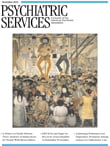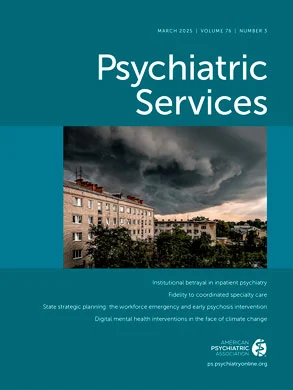Percentage of Hazardous Drinkers Who Might Be Treated in Primary Care
To the Editor: Treatment of hazardous drinking can occur in the primary care or specialty alcohol treatment sector, depending on severity. Guidelines from the World Health Organization (WHO) (
1 ) and the National Institute on Alcohol Abuse and Alcoholism (
2 ) suggest that individuals with less severe disorders are appropriate candidates for primary care treatment with evidence-based interventions, including screening and brief interventions.
We estimated the percentage of individuals with hazardous drinking who might be treated in primary care, using data from the second wave of the Healthcare for Communities survey (HCC2), conducted in 2000–2001 (
3 ). HCC2 data are nationally representative, and the survey includes the AUDIT (Alcohol Use Disorders Identification Test) (
1 ), developed by WHO to screen for hazardous drinking and to determine treatment setting. Estimates of the percentages of the population with hazardous drinking who can be treated in primary care and who require specialty care are vital for triage to the appropriate sector and allocation of scarce resources.
Our analysis was based on 7,893 respondents and was weighted to be representative of the adult U.S. population. (Percentages reported are weighted, and counts are unweighted.) WHO recommends that individuals with AUDIT scores between 8 and 15 receive simple advice in primary care to reduce hazardous drinking, those with scores from 16 to 19 should receive brief counseling and continued monitoring in primary care, and those with scores of 20 or greater should receive specialty treatment (
1 ).
In HCC2, 5.1% of the sample (N=427) had an AUDIT score of 8 or greater, and thus by WHO criteria should receive an alcohol intervention. Most met criteria for intervention in primary care (344 respondents, or 4.4%, with scores of 8 to 15, and 44 respondents, or .5%, with scores of 16 to 19). Only 39 (.3%) had scores indicating a need for specialty treatment. Thus, among individuals requiring an alcohol intervention, only one in 20 (.3%/5.1%) may initially require specialty treatment, according to WHO criteria.
The AUDIT manual does not discuss how comorbidity affects the treatment sector decision. One approach is to treat patients with comorbid disorders in specialty care. In the HCC2 sample, 1.7% (N=172) had an AUDIT score of 8 or greater and a comorbid mental disorder or problem drug use. Using this criterion, about one in three individuals (1.7%/5.1%) who require an intervention may initially require specialty treatment.
Although services for alcohol use disorders are often narrowly viewed as specialty treatment, by WHO guidelines most individuals with hazardous drinking are appropriate for primary care, at least initially, reserving specialty care for those with more severe alcohol problems, those with comorbid mental health or drug use problems, and those who do not appear to benefit from brief interventions. However, despite the evidence base for primary care treatment of hazardous drinking (
4,
5 ), barriers to implementing such interventions remain, including absence of insurance reimbursement, lack of trained personnel, and multiple demands placed on busy primary care practices. Sustained translational efforts are needed to overcome these barriers. Finally, we should note that the validity of the AUDIT recommendations has not been well studied.

